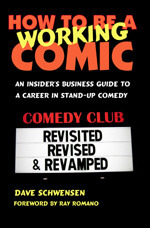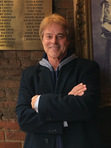Motivation for showcases
Dave – What’s the motivation for a talent booker to organize these showcases? What is the benefit to the booker and the club? – MB
Hey MB – Since your email came in not long after last week’s FAQ And Answer was posted, I know you’re referring to my mention of comedy club showcases in Los Angeles (and NYC). Instead of repeating myself, if anyone missed it you can just scroll down to the next article to read.
The motivation to organize a showcase is to find (scout) talent. Talent bookers, casting directors, producers, event planners and anyone else looking to hire comedians or speakers can organize or attend live performances to see for themselves before hiring someone. They also watch videos on the internet or DVDs, but when you’re in one of the big media markets – like LA or NYC – there are more (in my opinion) opportunities to see the performers in person.

Is it live or Memorex?
And you know live is always better – right?
If you don’t believe me, watch your favorite band on a DVD and then check them out in concert. There’s a big difference…
When I worked for The Improv in LA and NYC I would get calls from casting directors looking for certain types (I mentioned this last week). This could be for a movie, television show – or even a one-shot appearance on a late-night talk show.

In 3 minutes you’re done
For instance, when The Tonight Show set up a showcase, they were looking for comics who were (of course) funny and had the needed experience to do a high-profile (pressure is on!) show – which meant there was less of a chance they would freeze up or bomb when they hit the stage in front of the cameras. By scheduling a showcase in the club, they could watch a preselected number of comedians perform in front of a live audience and decide which ones were “ready” for the show. When I was there the comics were usually given about three minutes to prove their stuff.
I also did this with A&E’s An Evening At The Improv. I would watch tons of videos sent in advance, pick ten comics who could be ready to do the show, and schedule them for a Monday night showcase. Each would do three minutes on stage, which meant the showcase would be over in half an hour. There was never a “set number” of who would be booked that night to do the television show because it was an almost weekly process. You might find four or five in one night – and none the next.
But the bottom line is that it was an efficient (for bookers) and fair (for comedians) way to audition performers.
———————————————————————————
Sign up now for Dave’s free weekly newsletter and
receive 15% off the Amazon.com list price!
For info about Dave’s workshop at The Chicago Improv beginning February 1, 2014 visit this LINK!!
———————————————————————————
This is also how it was done for sitcoms, movies and other casting projects. Once when I was at the New York Improv I got a call from The Today Show. It was an election year and they wanted a comic that did political material. I already knew ten from our roster that would be great for the gig, so I called them and scheduled a showcase where they all came in on the same night and did three minutes of political stuff. The producers from The Today Show came to the club, watched the showcase and picked one. It made their job a lot easier than sending out a casting call and sitting through hundreds of videos and then scheduling auditions in their office.
So that would be the motivation for the talent booker.
For an agent or manager, they want their clients seen by the people who can give them work. They would schedule a showcase time, usually thirty minutes to an hour, with the club (in my case The Improv) and fill the spots from their roster of comedians. Then they would invite casting people, talent bookers, etc. to watch the showcase. If it was a manager promoting the showcase, they would also invite agents they wanted to represent their clients.

Got an appointment?
It was a lot of work to make these showcases successful, but again it beat the heck out of sending press packages and making phone calls to set individual appointments. Everyone would be in the same place at same the same time for a big schmooze-fest. In other words a good showcase is a prime networking and “doing business” opportunity.
So what’s the benefit for the booker? Again – an efficient way to find talent.
What’s the benefit for the club? Prestige and more business.
Think about it. If you owned a comedy club and had big-time producers and casting agents from every major network, film studio and agency hanging around scouting talent, every comic will want to perform there. And when you have the best comics on your stage, you get the most business because that’s what audiences want to see – good (funny) comedians. That’s why it’s just as competitive between the clubs to host industry showcases as it is for the comedians who want to be on them.
Showcasing is also beneficial for (humorous) speakers.
When I was an agent in NACA (National Association for Campus Activities) showcasing was the best way to score bookings. I won’t get into all the details on how this works – it’s in my book Comedy FAQs And Answers if you’re interested.

All kinds of performers
But in a nutshell, colleges and universities would send a delegation of Student Activities members to an NACA Conference in their regional area. They would go to various showcases over a few days and watch speakers and comedians (and all kinds of other performers) do twenty minute sets. This is how they would choose which ones they would book for the upcoming school year.
If you wanted to be booked – you pretty much had to be seen. That’s the purpose behind showcases. It’s an efficient and proven way to find talent and show your talent.
——————————————————————————————-
Dave Schwensen is the author of How To Be A Working Comic: An Insider’s Business Guide To A Career In Stand-Up Comedy, Comedy FAQs And Answers: How The Stand-Up Biz Really Works, and Comedy Workshop: Creating & Writing Comedy Material for Comedians & Humorous Speakers.
For details about upcoming comedy workshops at the Chicago Improv (beginning February 1, 2014 – visit this LINK) and Cleveland Improv Comedy Clubs, and private coaching for comedians and speakers by phone or via Skype visit www.TheComedyBook.com or email Dave@TheComedyBook.com
NEW – How To Be A Working Corporate Comic an 8-week online coaching program. For information visit this LINK!
Copyright 2014 – North Shore Publishing







